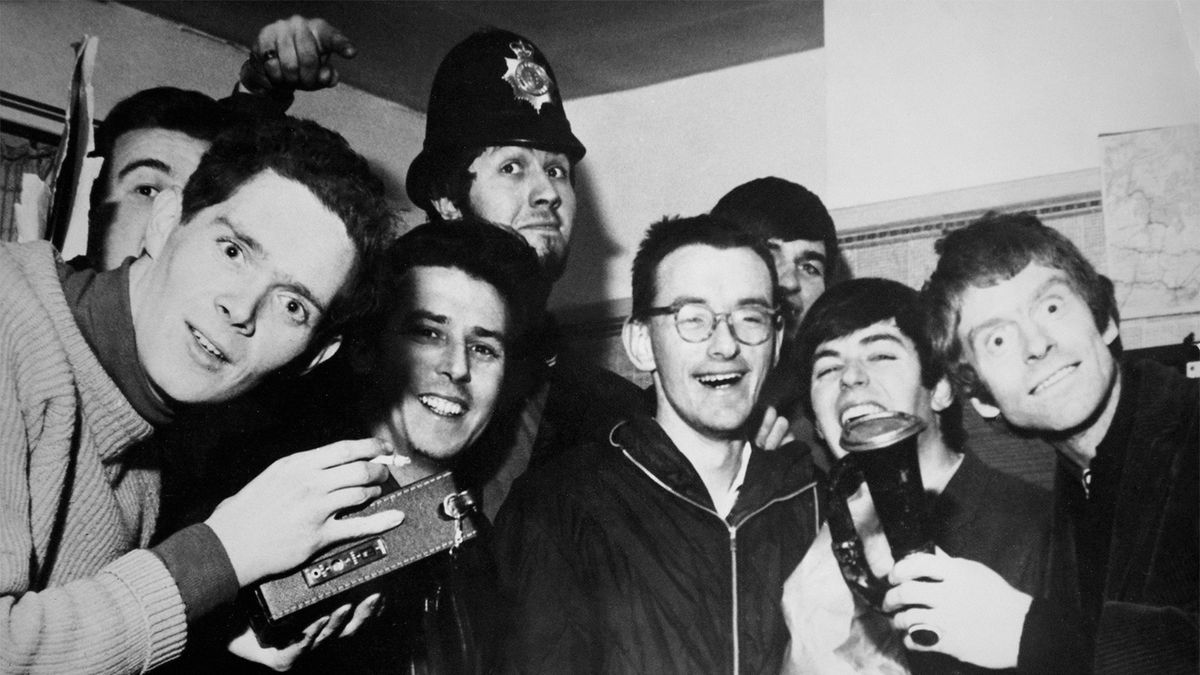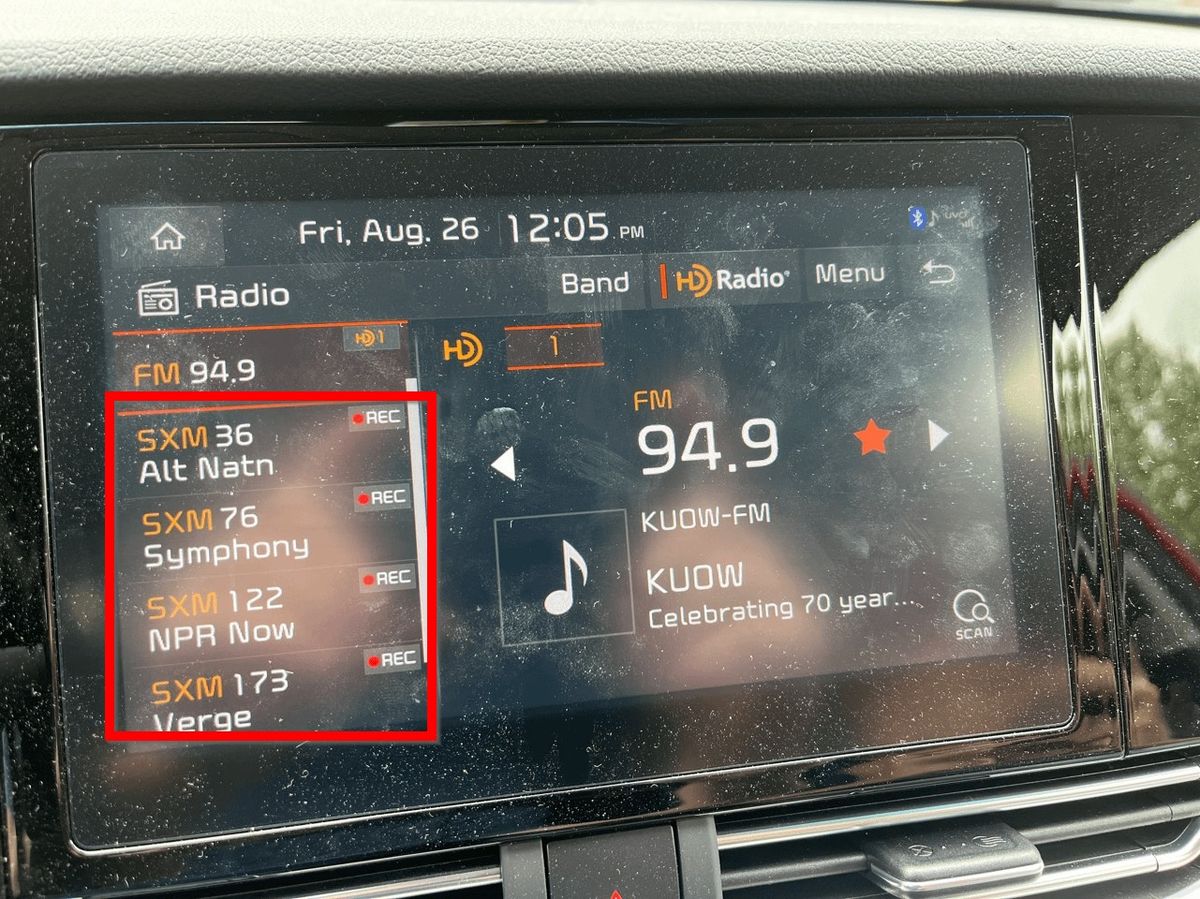Home>Devices & Equipment>Radio>What Is A Pirate Radio Station


Radio
What Is A Pirate Radio Station
Published: November 10, 2023
Discover the underground world of pirate radio stations and their impact on the radio industry. Learn what makes a pirate radio station and how they challenge traditional radio systems.
(Many of the links in this article redirect to a specific reviewed product. Your purchase of these products through affiliate links helps to generate commission for AudioLover.com, at no extra cost. Learn more)
Table of Contents
Introduction
Pirate radio stations have a rich history and storied reputation in the world of broadcasting. Bursting onto the scene in the mid-20th century, these clandestine stations provided an alternative voice for those who felt marginalized by mainstream media. Often operating without a license, pirate radio stations have thrived by pushing boundaries, championing underground music genres, and challenging established norms.
The allure of pirate radio lies in its rebellious spirit and the sense of freedom it offers. These stations have played a crucial role in amplifying the voices of countercultural movements, social activists, and independent artists. By circumventing traditional broadcasting regulations, pirate radio has provided a platform for individuals and communities to share their thoughts, ideas, and experiences.
With modern technological advancements, the landscape of pirate radio has evolved. While the term “pirate” may conjure up romanticized images of ships and hidden treasures, today’s pirate radio stations operate on a variety of platforms, including FM radio, internet streaming, and even mobile apps. Despite advancements in technology, the core ethos of pirate radio remains the same – to challenge the mainstream and provide a platform for diverse voices.
In this article, we will delve into the world of pirate radio, exploring its definition, history, operation, legal challenges, and impact on the broadcasting industry. Join us as we uncover the fascinating story of pirate radio and its enduring influence.
Definition of a Pirate Radio Station
A pirate radio station can be defined as an unauthorized, unlicensed radio operation that broadcasts without the permission or regulation of official broadcasting authorities. These stations operate on various frequencies, such as FM or AM, and often transmit from hidden or temporary locations, making it difficult for regulatory bodies to track them down.
What distinguishes pirate radio stations from legitimate radio stations is their lack of adherence to legal protocols and licensing requirements. While traditional radio stations operate under the jurisdiction of government agencies and are allocated specific frequencies and time slots, pirate radio stations operate outside these regulations, giving them the freedom to broadcast content without censorship or control.
Pirate radio stations are known for their renegade attitude. They are driven by a desire to provide an alternative voice and challenge the monopoly of mainstream media. These stations often target niche audiences and specialize in playing genres of music that are not widely represented on commercial radio stations. Furthermore, pirate radio stations are renowned for their community engagement, acting as a platform for local news, grassroots activism, and cultural expression.
Unlike legitimate radio stations that invest in professional equipment and infrastructure, pirate radio stations often have limited resources. They rely on makeshift studios and low-power transmitters to broadcast their signal. This can lead to a limited broadcast radius, typically ranging from a few miles to a few dozen miles, depending on factors such as terrain and transmitter power. However, despite their limited reach, pirate radio stations have a loyal following and play a vital role in amplifying diverse voices and fostering cultural diversity.
It is important to note that while pirate radio stations may operate illegally, their existence is not always viewed as negative. Some argue that pirate radio helps to democratize the airwaves, providing an outlet for communities that are underserved by mainstream media. However, it is worth mentioning that pirate radio stations do face legal consequences if they are discovered and apprehended by regulatory authorities.
Now that we have defined pirate radio stations, let us delve into their fascinating history and how they have shaped the broadcasting landscape.
History of Pirate Radio
The roots of pirate radio can be traced back to the 1960s when a number of freeform radio stations emerged in the United States. These stations sought to challenge the mainstream radio landscape by playing alternative music and giving airtime to marginalized voices. However, it was in the United Kingdom where pirate radio made its most significant impact.
In the early 1960s, the British Broadcasting Corporation (BBC) held a monopoly over radio broadcasting in the UK, operating under strict regulations that limited the variety of music and voices on the airwaves. Frustrated by this lack of diversity, several innovative individuals took matters into their own hands and started broadcasting from offshore locations, on ships known as “radio ships.”
One of the most famous pirate radio ships was Radio Caroline, which began broadcasting from international waters in 1964. This station played popular music genres like rock and pop, which were not adequately represented on the BBC. Radio Caroline’s success inspired others to follow suit, and soon a flotilla of radio ships, including Radio London and Radio North Sea, populated the North Sea, challenging the British broadcasting establishment.
The rise of pirate radio in the UK sparked a cultural revolution. These stations attracted millions of listeners who preferred the diverse music and uncensored content they offered. They became significant contributors to the “Swinging Sixties” cultural movement and facilitated the popularization of bands like The Beatles, The Rolling Stones, and The Who.
In an effort to regain control over the airwaves, the UK government passed the Marine Broadcasting Offences Act in 1967, effectively outlawing pirate radio stations operating from ships. The radio ships were forced to shut down, but pirate radio stations found new ways to continue their operations. They moved onshore, broadcasting from hidden locations such as towers, rooftops, and even basements.
The evolution of technology played a crucial role in the expansion of pirate radio. In the late 20th century, advancements in broadcasting equipment and the emergence of the internet allowed pirate radio to reach a global audience. Stations no longer needed physical transmitters; they could broadcast digitally, making it even more challenging for regulatory bodies to shut them down.
Today, pirate radio stations continue to thrive, adapting to new platforms such as internet streaming and mobile apps. While their methods of operation have changed, their mission remains the same: to challenge mainstream media and provide a platform for diverse voices.
Now that we have explored the history of pirate radio, let us delve into how these stations operate and the challenges they face.
Operation of Pirate Radio Stations
Pirate radio stations operate outside the realm of traditional broadcasting regulations, often utilizing unauthorized broadcasting methods to transmit their signals. The specific operational details can vary, but there are common elements that define the functioning of these renegade stations.
One of the primary challenges for pirate radio stations is obtaining a suitable frequency to broadcast on. This is typically achieved by identifying unused or underutilized frequencies in the FM or AM bands. Once a frequency is selected, the station sets up a transmitting mechanism, which can range from low-power transmitters to more sophisticated equipment, depending on the resources available.
The location of the broadcasting equipment is also a critical aspect of operation. Pirate radio stations often choose hidden or temporary locations to avoid detection by regulatory authorities. These locations can include rooftops, abandoned buildings, or even mobile setups that can be quickly moved if necessary.
Programming and content curation are essential components of pirate radio stations. These stations often cater to niche audiences, focusing on specific music genres or cultural movements that are not commonly represented on mainstream radio. This allows them to attract a loyal and dedicated listenership.
Technology plays a significant role in the operation of pirate radio stations. Modern advancements have made it easier for these stations to reach a wider audience. Many pirate radio stations now utilize internet streaming as a primary method of transmission. By leveraging online platforms and digital technologies, these stations can bypass traditional broadcasting infrastructure and cater to a global audience.
Pirate radio stations also rely heavily on community engagement. They serve as platforms for local news, events, and grassroots activism. These stations provide a voice for communities that may feel overlooked or underrepresented by mainstream media. In this way, pirate radio acts as a catalyst for cultural expression and a source of information for the communities they serve.
However, it is important to note that operating a pirate radio station comes with risks and challenges. Regulatory bodies actively seek to shut down these stations due to their lack of licensing and adherence to broadcasting regulations. This can result in legal consequences for those involved, including fines and confiscation of equipment.
Despite the challenges they face, pirate radio stations continue to thrive, adapting to new technologies and finding innovative ways to reach their audience. The independence and rebellious spirit of these stations allow them to foster diverse voices, challenge established norms, and push the boundaries of traditional broadcasting.
Now that we have explored the operation of pirate radio, let us examine the legal issues and challenges that these stations encounter.
Legal Issues and Challenges
Pirate radio stations face a multitude of legal issues and challenges due to their unauthorized and unlicensed operations. Operating outside the boundaries of broadcasting regulations can lead to various consequences for these renegade broadcasters.
One of the primary legal challenges that pirate radio stations face is the violation of broadcasting laws and regulations. Broadcasting authorities require stations to obtain licenses and adhere to specific guidelines to ensure fair competition, spectrum allocation, and content regulation. Pirate radio stations that operate without these licenses are susceptible to fines, confiscation of equipment, and potential legal action.
Regulatory bodies actively seek to identify and shut down pirate radio stations. Government agencies, such as the Federal Communications Commission (FCC) in the United States or Ofcom in the United Kingdom, employ enforcement divisions dedicated to detecting and taking action against pirate broadcasters. These enforcement divisions employ field agents equipped with specialized equipment to track down and locate pirate radio stations.
While pirate radio stations often operate in obscure or hidden locations, their transmissions can be detected and triangulated using radio direction-finding equipment. Regulators track the signal strength of the station and, by using multiple measurement points, can pinpoint the general location of the broadcast. This information assists in enforcement actions against the pirate radio station.
Another legal challenge for pirate radio stations is the potential interference they cause to licensed broadcasters sharing the same frequency or neighboring frequencies. The unauthorized transmissions from pirate stations can disrupt or distort the reception of licensed stations, impacting their ability to reach their intended audience and potentially resulting in financial losses.
In some cases, pirate radio stations may also face legal action from copyright holders, particularly if they broadcast copyrighted music without obtaining appropriate licenses. These copyright issues can lead to legal battles and potential financial settlements, further adding to the legal challenges faced by pirate broadcasters.
Despite these legal hurdles, pirate radio operators are resilient and often find ways to evade detection and continue their operations. They may relocate frequently, change broadcasting frequencies, or adopt encrypted or underground broadcasting methods to complicate enforcement efforts.
However, it is crucial to note that not all jurisdictions view pirate radio stations in the same light. Some regions have taken a more lenient approach, recognizing the value of these stations as alternative voices in the media landscape. They may choose to impose lighter penalties or even work towards legitimizing certain aspects of pirate radio operations.
Now that we have explored the legal challenges faced by pirate radio stations, let’s examine the impact these renegade broadcasters have on the broadcasting industry.
Impact of Pirate Radio Stations
Pirate radio stations have had a significant impact on the broadcasting industry and the communities they serve. While operating outside the boundaries of traditional licensing and regulations, these renegade broadcasters have played a crucial role in shaping the media landscape in several ways.
One of the most notable impacts of pirate radio stations is their ability to amplify underrepresented voices and give a platform to marginalized communities. These stations often cater to niche audiences and play genres of music that are not widely represented on mainstream radio. This allows for the promotion of diverse cultural expressions and fosters a sense of inclusivity and community among listeners.
Pirate radio stations also challenge the monopoly of mainstream media and provide an alternative voice. These renegade broadcasters often focus on uncovering and highlighting underreported news stories, promoting grassroots activism, and exposing social and political issues that may not receive sufficient coverage from traditional media outlets. They act as a counterbalance to the narratives presented by corporate-controlled media, offering listeners a wider range of perspectives and viewpoints.
Furthermore, pirate radio stations have played a vital role in the evolution and popularization of music genres. These stations have been instrumental in introducing new artists, breaking unconventional music styles, and creating a platform for independent musicians who may not have access to mainstream distribution channels. Through their dedication to non-commercial music genres, pirate radio has fostered vibrant music communities and influenced the development of various music scenes.
In addition, pirate radio has been a breeding ground for talent and innovation in broadcasting. Many well-known radio personalities and DJs started their careers on pirate radio stations, honing their craft and building a dedicated following. Pirate radio provides an avenue for aspiring broadcasters to gain experience, experiment with content creation, and connect directly with their audience, often leading to opportunities in the mainstream broadcasting industry.
The impact of pirate radio stations is not limited to the cultural and artistic realms; it also extends to the realm of policy and regulation. The challenges that pirate radio stations pose to traditional broadcasting regulations have prompted discussions and reconsiderations of existing policies. Regulatory bodies and policymakers have been compelled to reassess their approaches to licensing, spectrum allocation, and content regulations, acknowledging the changing dynamics and demands of the media landscape.
However, it is important to acknowledge that pirate radio stations also face criticism and regulatory action due to their unauthorized operations. Critics argue that their activities can cause interference with licensed broadcasters and potentially undermine the integrity of the broadcasting industry.
Overall, the impact of pirate radio stations cannot be overlooked. They have empowered communities, fostered cultural expression, challenged mainstream narratives, and contributed to the evolution of music and broadcasting. They remain a vital and influential force in the media landscape, continuing to push boundaries and advocate for diverse voices.
Now, let us conclude our exploration of pirate radio and reflect on its enduring significance.
Conclusion
Pirate radio stations have a longstanding history of challenging the status quo and providing an alternative voice in the broadcasting industry. From their humble beginnings on radio ships in the 1960s to their modern-day digital operations, pirate radio has consistently pushed boundaries, amplified underrepresented voices, and fostered cultural diversity.
Despite operating outside the boundaries of traditional licensing and regulations, pirate radio stations have made a lasting impact. They have given a platform to niche music genres, provided outlets for grassroots activism, and shed light on social and political issues often ignored by mainstream media.
One of the key strengths of pirate radio lies in its ability to bring communities together. By focusing on local news, events, and cultural expressions, these stations have often become integral parts of communities, offering a voice to those who feel marginalized or overlooked. They have helped cultivate vibrant and inclusive local cultures.
Pirate radio has also served as a breeding ground for talent and innovation. Many renowned radio personalities and DJs have started their careers on pirate stations, leveraging the freedom and platform provided by these renegade broadcasters to hone their skills and build dedicated followings.
While pirate radio stations face legal challenges and the risk of regulatory action, they continue to thrive by adapting to new technologies and finding innovative ways to reach their audiences. The resilience and unwavering commitment to alternative voices have solidified their place in the media landscape.
As we look to the future, the significance of pirate radio cannot be underestimated. It will continue to challenge traditional broadcasting norms and act as a force for change and cultural expression. The impact of pirate radio stations will extend far beyond their unlicensed operations, shaping the broader broadcasting industry and inspiring discussions on licensing, regulations, and content diversity.
In conclusion, pirate radio stations have left an indelible mark on the broadcasting world. These renegade broadcasters have defied convention, championed underrepresented voices, and provided an avenue for artistic expression and cultural diversity. As the media landscape continues to evolve, the influence of pirate radio stations will endure, reminding us of the power of grassroots movements, independent voices, and the importance of challenging the status quo.











